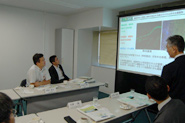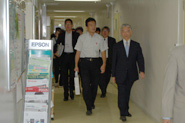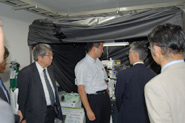| 2011.10.24 |
Our paper entitled "Accumulation of sub-100 nm polymeric micelles in poorly permeable tumours depends on size" was published in Nature Nanotechnology (Published online: 23 October 2011; doi:10.1038/nnano.2011.166) and the research of the paper was carried in Mainichi Newspaper, Sankei Newspaper, Yomiuri Newspaper etc.
In this study, we improved the tissue penetration and efficacy of polymeric micelles against poorly permeable pancreatic cancers by controlling their size below 50 nm. We also demonstrated that the penetration of the larger micelles could be enhanced by using a transforming growth factor-β inhibitor. Our findings should provide important knowledge for designing nanocarriers for the targeting intractable cancers. This study was published in Nature Nanotechnology (Published online: 23 October 2011; doi:10.1038/nnano.2011.166).
Abstract: http://www.nature.com/nnano/journal/vaop/ncurrent/abs/nnano.2011.166.html
- October 24, 2011 Mainichi Newspaper
- Headline: Targeting pancreatic cancers by nano-scaled capsule. Success in the tumor growth inhibition.
- October 24, 2011 Sankei Newspaper
- Headline: Drug delivery by nano-scaled capsule. Novel treatment of pancreatic cancers.
- October 24, 2011 Nikkei Sangyo Newspaper
- Headline: Targeting pancreatic cancers. Encapsulation of anticancer drug into polymeric capsule.
- October 24, 2011 Yomiuri Newspaper (Evening)
- Headline: Treatment of pancreatic cancers by nano-scaled capsule. Success in therapeutic experiment using animal model.
- October 24, 2011 Nippon Keizai News Paper
- New method to administer antitumor drug toward pancreatic cancer treatment. Encapsulation with polymer.
- October 24, 2011 Nikkan Kogyo News Paper
- Pancreatic cancer treatment by drug delivery. Nano-capsule smaller than 50nm shows efficacy.
- October 24, 2011 Iwate Nippo
- Drug delivery to pancrease by nano-scale capsule. Successful targeting of cancer cells.
- October 24, 2011 Kagaku Kogyo Nippo
- Size effect of polymeric micelle for pancreatic cancer treatment.
- October 24, 2011 Akita Sakigake Shinpo
- Drug delivery to pancrease by nano-scale capsule. Successful targeting of cancer cells.
- November 12, 2011 Le Figaro Magazine
- Quot De Neuf, Docteur? Particules salutaries
|
| 2011.1.28 |
Targeting therapy to treat drug-resistant tumor by polymeric micelles were carried in Nikkei Sangyo Shimbun.
- January 28, 2011 Nikkei Sangyo Shimbun
- Title : TechnoTrend: Advancing Drug Delivery System, Targeting Cancer Cell by Nanotechnology and Physiology.
Targeting therapy of drug-resistant tumor has been achieved by polymeric micelles loaded with platinum-based anti-cancer drug (DachPt). Polymeric micelles were made by self-assebly of block copolymers, and were able to stably circulate blood stream, thereby successfully approaching tumor cells after extravasation by EPR effect. Micelles selectively release loaded drugs responding to pH decrease in perinulear region just like nano-scaled Trojan Horse.
|
| 2011.1.24 |
Our research "Drug Delivery System overcomes the acquired drug resistance in cancer cells" was carried in TV program by NHK. (The pdf file is available from here.)
- January 24, 2011 NHK “Hello from Studio Park”(13:05-13:55) “Comments on news in living”
- Title : “Attack the cancer cells: New drug delivery system.”
URL: http://www.nhk.or.jp/kaisetsu-blog/200/70771.html
|
| 2011.1.17-18 |
The ”International Symposium on Integrative Research to Lead Social Deployment of Medical Innovation” was held jointly with “System Integration for Industrialization of Regenerative Medicine: Creation of Organ Factory” which Professor Okano of Tokyo Women's Medical University leads in Chiyada-ku, Tokyo on Jan. 17th and 18th 2011.
On Jan. 17th, there were plenary lectures by invited speakers, project introduction by Professor Kataoka and Professor Okano, panel discussion “How can we accelerate social deployment of advanced research?” In a panel discussion, expectations for the projects, obstacles for social deployment, human resource development and other topics were covered and very profound and insightful discussions were held.
On 18th, invited speakers had lectures and poster session followed. Member companies had their exhibitions along with researchers’ posters. There were very active discussions on each poster. Project member lectures and professor Kataoka’s and professor Okano’s speech concluded the two day symposium. There were around 1000 participants for the symposium which represents very high expectations for the outcome of the research and their contributions for advancement of medical system in Japan.
(Poster・Handbill)
 |
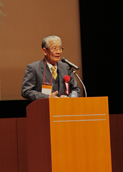 |
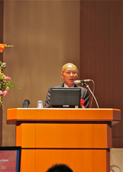 |
Stefan Noreén
Ambassador, Embassy of Sweden |
Fumimaro Takaku
President, The Japanese Association of Medical Sciences |
Masuo Aizawa
Executive member, Council of Science and Technology Policy |
 |
|
| 2011.1.6 |
Our paper entitled "Improving drug potency and efficacy by nanocarrier-mediated subcellular targeting" was selected as a cover of Sci. Transl. Med.(Vol.3, No.64, January 2011) and the research of the paper was carried in Nippon Keizai Newspaper, Mainichi Newspaper, Yomiuri Newspaper, NHK News etc. (The pdf file is available from here.)
- January 5, 2011 Science Translational Medicine
- Cover: Drug Delivery by Micelle
- January 6, 2011 NHK News
- Headline: Nanocapsules show efficacy against drug-resistant cancer
- January 6, 2011 Technology Review
- Headline: Nanocarriers Come Through
- January 6, 2011 Nippon Keizai Newspaper
- Headline: Nano-scaled capsules deliver the drug into the cell. The University of Tokyo developed them and demonstrated their efficacy against cancer.
- January 6, 2011 Mainichi Newspaper
- Headline: Nano-scaled capsules directly deliver the drug into the diseased site. Animal experiments revealed their efficacy against drug-resistant cancer
- January 6, 2011 Yomiuri Newspaper
- Headline: Development of nano-scaled capsules showing the effect on the nucleus of the cell. Enhanced efficacy of anticancer drug.
- January 6, 2011 Nikkan Kogyo Newspaper
- Headline: Attack on drug-resistant cancer: The University of Tokyo developed polymer vehicle.
- January 6, 2011 Nikkei Sangyo Newspaper
- Headline: Administration of anticancer drug by utilizing nanocapsules: The University of Tokyo demonstrated the growth inhibition effect of cancer.
- January 6, 2011 Tokyo Newspaper
- Headline: Development of new nano-scaled capsules: Trojan horses for the treatment of drug-resistant cancer.
- January 6, 2011 Hokkaido Newspaper
- Headline: Professor in The University of Tokyo developed new drug to show the efficacy selectively against colon cancer cells and reduce side effects.
- January 6, 2011 Shinano Mainchi Newspaper
- Headline: Development of new injection method of anticancer drug: nano-scaled capsules deliver the drug to the drug-resistant cells. Professor in The University of Tokyo demonstrated the efficacy in mice.
- January 6, 2011 Science Japan
- Headline: This Week's Translational Medicine 2011.1.5 Volume3 Number64
- January 6, 2011 School of Engineering The University of Tokyo (Publicity)
- Headline: Drug delivery systems overcome acquired resistance to anticancer drug: Development of nano-scaled Trojan horse to efficiently deliver drug to the nucleus of drug resistant cancer cells
- January 7, 2011 The Chemical Daily
- Headline: Polymeric micelles exerted drug efficacy against drug-resistant cancer. Professor Kataoka demonstrated the efficacy in mice.
- January 7, 2011 Kumamoto Nichinichi Newspaper
- Headline: Effectiveness against drug ineffective cancer: Development of new method of drug administration using nano-scaled capsules
- January 11, 2011 Tokushima Newspaper
- Headline: Trojan horse for the treatment of drug ineffective cancer: Development of new method of drug administration using nano-scaled capsules
In this study, polymeric micelles incorporating the oxaliplatin parent complex, DACHPt, were demonstrated to show the selective dissociation responding to the late endosomal and lysosomal conditions, thus circumventing the cytoplasmic detoxification systems to facilitate drug delivery to the nucleus. As a result, DACHPt-loaded micelles overcame the oxaliplatin-resistance in vitro and in vivo. The above-mentioned functions of the micelles were intravitally demonstrated by utilizing in vivo confocal microscopy combined with dual fluorescent labeling of the constituent block copolymers. This study was published in Science Translational Medicine (5 January 2011; Vol. 3, Issue 64) and selected as a cover picture.
|
| 2010.12.16 |
Targeting therapy of cancer by polymeric micelles was carried in Yomiuri Shimbun.
- December 16, 2010 Yomiuri Shimbun, the Science Section of the Evening Edition
- Headline: Cancer Targeting
Targeting therapy of intractable cancers has been achieved by polymeric micelles loaded with chemotherapy reagents. Polymeric micelles were made by self-assebly of block copolymers, and are expected to have wide applicability in treatment of intractable cancers, including pancreatic cancer and scirrhous gastric cancer. Future perspectives of these nanocarriers were also described in this report.
|
| 2010.9.9 |
Development of visible drug delivery system for the diagnosis and therapy of pancreatic tumors was carried in Mainichi Newspaper, Nikkei Sangyo Newspaper, Nippon Keizai Newspaper (Web), and Kagaku Shimbun (Professor Kazunori Kataoka, Graduate Schools of Engineering and Medicine, The University of Tokyo, Professor Toru Tani, Department of Surgery, Shiga University of Medical Science, and Dr. Ichio Aoki, Molecular Imaging Center, National Institute of Radiological Sciences)
- September 9, 2010 Mainichi Newspaper
- Headline: Clear visualization of anticancer agents. Monitoring therapeutic response in each patient for customized caner therapy.
- September 9, 2010 Nikkei Sangyo Newspaper
- Headline: Drug delivery systems for simultaneous imaging and therapy. Successful treatment of pancreatic tumors in mice.
- September 9, 2010 Nippon Keizai Newspaper (Web)
- Headline: Development of novel drug delivery systems directing to single-platformed diagnosis and therapy which can non-invasively monitor tumor accumulation and therapeutic effect of anticancer agents.
- Octorber 1, 2010 Kagaku Shimbun
- Headline: Novel drug delivery systems directing to single-platformed diagnosis and therapy. Effectiveness against mouse pancreatic cancer models was confirmed by MRI.
Theranostic polymeric micelles incorporating clinically approved gadolinium (Gd)|ased magnetic resonance imaging contrast agents and platinum (Pt) anticancer drugs were developed. By utilizing theranostic micelles, simultaneous imaging and therapy of an orthotopic pancreatic cancer model in mice was successfully performed without any serious toxicity. Thus, theranostic micelles can visualize their biodistribution and tumor accumulation in a real-time manner, allowing prediction of the efficacy and side effects for successful and safe cancer therapy. Also, theranostic micelles can allow to follow the therapeutic response in each cancer patient and realize early feedback of the treatment efficacy to optimize the treatment protocol for eradication of malignancies.
|
| 2010.9.9 |
Parliamentary Secretary of Cabinet Office for Economic and Fiscal Policy, Science and Technology Policy, and Promotion of Local Sovereignty, Keisuke Tsumura visited Center for Nanobio Integration and Nanobio First project in the Tokyo University. After projects were reviewed by Professor Kataoka and Mr. Tsumura visited research facilities and communicated with researchers.
|
| 2010.9.8 |
The press conference on the paper “Visible-drug delivery by supra-molecular nanocarriers directing to single-platformed diagnosis and therapy of pancreatic tumor model” for Cancer Research Sep. 15th issue was held at the University of Tokyo.
|
| 2010.9.2 |
Dr. Cristina Garmendia, the Minister of Science Innovation, Spain, and her delegates visited Nanobio First Project at Tokyo University. They had briefing on the project by Professor Kataoka and visited research facilities.
|
![NanoBio First - Funding Program for World-Leading Innovative R&D on Science and Technology_[Development of Innovative Diagnostic and Therapeutic Systems Based on Nanobiotechnology]](../common/img/head_title.gif)




